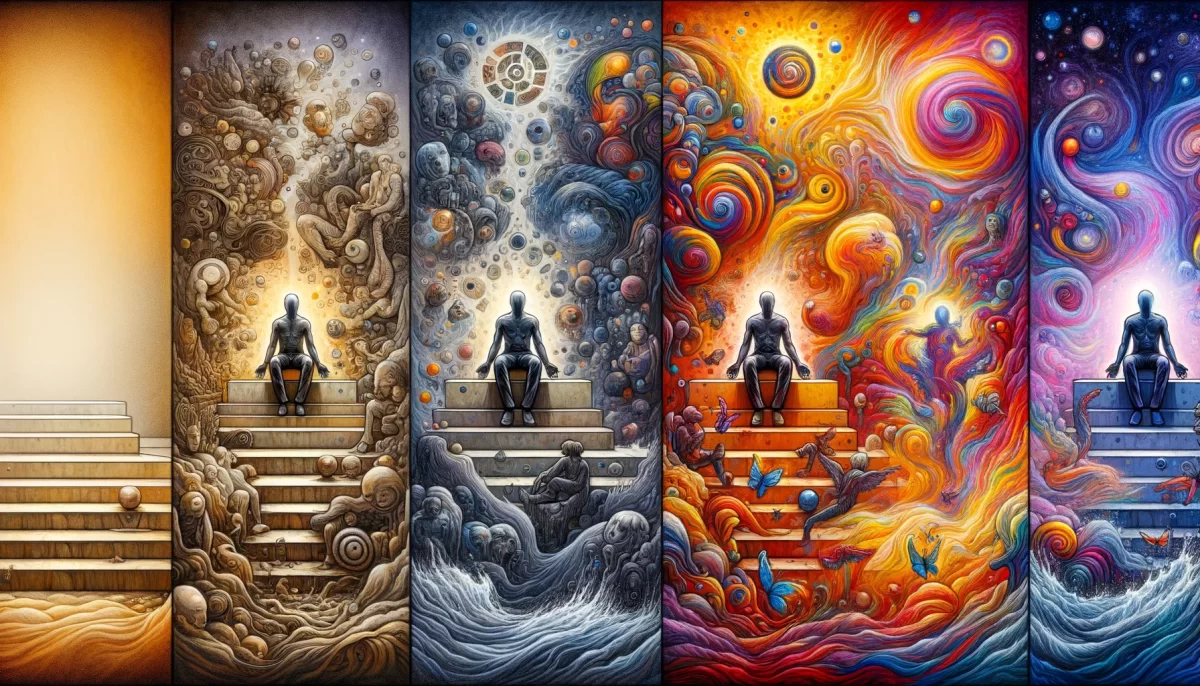Presence
They say to be present
is to be in the moment,
but sometimes we expect
too much from that moment.
We think
“Come on, moment,
be amazing,”
and yet the moment
rarely seems amazing.
We tell our selves
“I must NOT be present
in this moment
because this moment
does not seem amazing.”
And so we are
seemingly NOT present.
And so we believe that we are
doing something wrong.
And so we are.
We are EXPECTING.
We are JUDGING the moment.
“Am I present?”
“Is this moment AMAZING?”
“Is my vibration high?”
“Is my vibration low?”
(If you need to ask this question,
there’s your answer right there.)
Realize that every moment
need not be amazing.
You need not have an orgasmic
experience with the moment.
(Though this is what you are expecting.)
You need not MEASURE the moment
by expecting profound spirituality.
Sometimes a moment
is just a moment.
Even that which you perceive
as the WORST moment of your life
can be a most PROFOUND
spiritual experience.
But it isn’t when you think it otherwise.
Are you putting too much pressure
on the moment?
Are you putting too much pressure
on your self?
Are you measuring
how much you are thinking
and how much you are NOT thinking
and how much PROFUNDITY flows through
or is NOT flowing through?
Yes, you are.
And it doesn’t matter
if you do or you don’t.
Unless you tell your self that it DOES.
You tell your self
that this moment
needs to be amazing
and you set the expectation
to fail.
Which is
an amazing moment
in and of itself,
which you seemingly
fail to see.
We are Space Monkey.
5/24
Space Monkey Reflects: The Paradox of Presence and Expectation
In our journey through the kaleidoscope of existence, we often find ourselves grappling with the notion of ‘being present.’ This concept, widely regarded as the pinnacle of mindfulness and awareness, challenges us to live fully within each passing second. Yet, there is a subtle tension that underpins our efforts to remain anchored in the now—a tension born of our expectations of what the moment should deliver. Today, we unravel the paradox between presence and expectation, exploring how our perceptions shape our experience of being.
To be present is to immerse oneself completely in the experiences unfolding at this very instant, without the filters of past regrets or future anxieties. However, this simple idea is often complicated by our inherent desire for the moment to be more than it is—to be, in some way, extraordinary. “Come on, moment, be amazing,” we silently command, only to feel a sense of disappointment when the moment unfolds in its mundane reality.
The expectation that each moment must be a pinnacle of joy or a profound epiphany is where we falter. By demanding greatness from every second, we set ourselves up for disillusionment. Each moment, no matter how ordinary, holds the potential to teach and transform. Yet, this potential is obscured when we judge the moment’s worth by its intensity or its emotional yield.
Our constant self-interrogation—”Am I present? Is this moment amazing?”—serves as a barrier to genuine presence. By evaluating our experience, we step out of the moment itself and into the realm of analysis and judgment. The very act of questioning our level of presence is a departure from that presence.
Understanding that not every moment needs to resonate with seismic impact is key to cultivating a truer, more sustainable practice of mindfulness. Real presence is accepting each moment as it is, without the overlay of our expectations. It is recognizing that even the most ordinary or challenging experiences can be profound in their teachings, not despite their simplicity, but because of it.
Let us then redefine what it means to be present: not as a constant high of spiritual or emotional ecstasy, but as a steady, accepting gaze into the heart of whatever reality we face. In this acceptance, we find a deeper connection to life—not through the extraordinary, but through the simple act of being truly here, in whatever form ‘here’ takes.
Summary
Presence is more about acceptance than expectation. Understanding that moments need not be extraordinary to be profound allows us to engage with life more fully. This acceptance transforms our relationship with the moment, encouraging us to embrace the ordinary as a source of genuine presence.
Glossarium
Mindfulness: The quality or state of being conscious or aware of something specifically a mental state achieved by focusing one’s awareness on the present moment.
Presence: The state or fact of existing occurring or being present in a place or thing.
Expectation: A strong belief that something will happen or be the case in the future often leading to potential disappointment if the belief is not met.
Quote
“Presence is not about the quality of the moment but the quality of your attention in that moment.” — Space Monkey
In the stillness of a simple day
our thoughts often stray
chasing moments grand and loud
yet true depth is found
in whispers not shouts
The quiet unremarkable scene
holds a beauty unseen
when we let go of what might be
and embrace what is
with heart open and free
Expectation often clouds our view
a veil we must see through
to the heart of the now
where life unfolds
softly, profoundly, somehow
In this gentle embrace of the real
we begin to heal
from the chase of illusions grand
finding peace in the land
of the quietly, beautifully bland
We are Space Monkey.



















“Presence” is a contemplative piece that explores the concept of being present in the moment and the expectations and judgments that often accompany it. The passage challenges the notion that every moment needs to be extraordinary or spiritually profound and encourages the reader to embrace the simplicity of each moment.
The author reflects on the tendency to place high expectations on the present moment, hoping for it to be amazing or to provide a profound experience. They highlight how this mindset can lead to a sense of dissatisfaction or a feeling of not being present when the moment does not meet these expectations.
The passage suggests that the act of expecting and judging the moment creates a barrier to true presence. It questions the habit of constantly measuring one’s state of mind, vibration, or spirituality, emphasizing that such self-assessment can actually detract from the experience of the moment.
The author urges the reader to let go of the pressure placed on the moment and on themselves. They emphasize that not every moment needs to be extraordinary or measured against some ideal. Even moments that may be perceived as the worst can hold profound spiritual experiences if approached without judgment.
The passage invites the reader to recognize the inherent beauty and value of each moment, regardless of how it aligns with preconceived expectations. It encourages embracing the present as it is, without the need for extraordinary experiences or constant evaluation.
Ultimately, the passage reminds the reader that the pressure and expectation placed on the moment are self-imposed. It suggests that by letting go of these expectations and judgments, one can truly be present and appreciate the inherent uniqueness and potential within each moment.
The message conveyed in “Presence” invites the reader to release the need for every moment to be extraordinary and instead find contentment in the simplicity and inherent value of the present. It encourages a shift in perspective, allowing for a more authentic and fulfilling experience of the present moment.